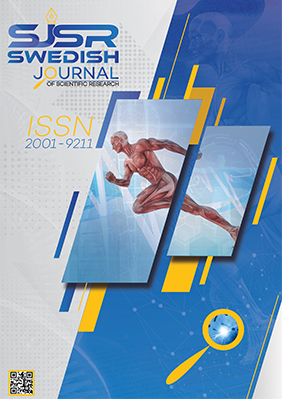SWEDISH JOURNAL OF SCIENTIFIC RESEARCH
SJSR October issue2016 | Issue 10 / OCT |
|---|---|
|
P. 1 - 9
SJSR-00057
|
This part includes introduction of the study. It included an introduction and significance of the study as it talks about the evolution witnessed\r\nby the extent of practice by physical education teachers to principles of effective teaching. It is also significant for supervisors. As for\r\nproblem of the study, it lies in that there is a weakness in practice by physical education teachers of principles of teaching performance\r\nin Koya district, Kurdistan Region. The objective of the study was (to identify the extent of physical education teachers’ use of effective\r\nprinciples of teaching and management from the perspective of Physical Education supervisors in Koya district, Kurdistan Region), while\r\nscopes of the study are: (the human aspect: Supervisors of Physical Education in Koya district, the spatial aspect: Directorate of Education\r\nin Koya district, Kurdistan Region and temporal aspect: From 11/01/2015 until 30/04/2016. The used methodology and field procedures,\r\nthe researcher used the descriptive approach as it is convenient to nature of the problem under study. Part four includes displaying\r\nresults, analysis and discussion as well as results and statistical treatments, their analyzed and classification in a group of diagrams. Part\r\nfive is about conclusions and recommendations: (most of the paragraphs in the field of planning achieved weighing means that exceed\r\nthe threshold of answers, weighing means showed some drawbacks being less than the threshold of answers, the degree of practicing\r\neffective teaching principles by physical education teachers relating to application showed that they were practiced largely in general, the\r\ndegree of practicing effective teaching principles by physical education teachers relating to class management showed that they were\r\nbeing practiced largely, most paragraphs in the field of education received high scores and this showed that the teacher exercised his\r\nprofession well and there is a clear development in the practice of teachers). From findings of the study, it is noticed that the degree of\r\npracticing effective teaching principles by physical education teachers relating to evaluation showed that they were being practiced largely. Rebaz Magid Amin, et al, 2016. The Extent of using Principles of Teaching & Effective Management by Physical Education Teachers from the Perspective of Physical Education\nSupervisors in Koya District, Kurdistan Region. Swedish Journal of Scientific Research.; 3(10):1-9.
|
|
P. 10 - 17
SJSR-00058
|
This study includes an introduction, problem, objectives, hypotheses, scopes and field procedures of the study. The researchers used the empirical method as it is appropriate to the problem. Population of the study is represented in students of the third stage of gymnastics lesson for men in Faculty of Physical Education, Waset University. The sample was divided into two groups (empirical and control groups). The learning-embarrassment scale was also used as a test of the sample with skill performance of hand stand skill in\r\nmen’s parallel bar. Statistical means were used in data treatment using Statistical Package for the Social Sciences (SPSS). Results were presented and discussed using a discreet scientific method. The researchers concluded that: There were significant results in pre- and post- tests for the empirical group in situation-embarrassment and skill performance of hand stand skill in men’s parallel bar, there were significant results in pre- and post- tests for the control group in situation-embarrassment and skill performance of hand stand skill in men’s parallel bar and there were significant results in post- tests for the empirical and control groups in situation embarrassment and skill performance of hand stand skill in men’s parallel bar. Amen Ata Hassan, et al, 2016. The Effect of using Blended Learning in Situation-Embarrassment and Hand Stand Skill in Parallel Bar for Men. Swedish Journal of Scientific Research.; 3(10):10-17.
|
|
P. 18 - 30
SJSR-00059
|
The objective was to provide player`s general assessment of a “boil-and-bite” and two-component mouth guard in terms of comfort and subjective impressions in handball, basketball, and field hockey. Additionally, the orofacial trauma experience was investigated.\r\nAwareness of mouth guard as a preventive device was 100 % in basketball, 82.5 % in field hockey, and 71.4 % in handball, but only one basketball player and none in handball wore a mouth guard. The most frequent reason for no mouth guard use was “never thought about this”. 84.2 % of the field hockey players used always a mouth guard in games, and 36.8 % in training. The most frequent source\r\nof advice were coaches/club members (66.6 %). 57.7 % from 44 participants who used no mouth guard had orofacial injuries (soft tissue laceration 59.6 %, concussion 27 %, tooth fracture and loss 26.6 %, jaw fracture and luxation 13 %). The incidence of trauma shows that educational campaigns about mouth guard use need to be directed to the coaches, clubs, families and players. Antina Schulze, 2016. Assessment of Standard, Self-Adapted\r\nMouthguards in Terms of Comfort and Use in Handball, Basketball, and Field Hockey. Swedish Journal of Scientific Research.; 3(10):18-30.
|


